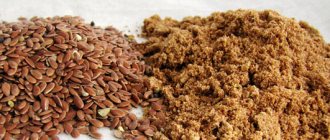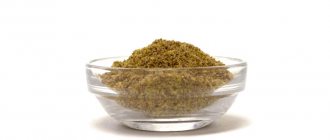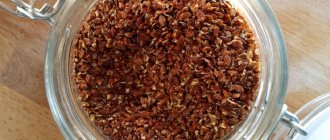Back to list Previous article Next article
21.06.2021
Tags:
useful, flax seeds
( 4 ratings, average: 5.00 out of 5)
Flaxseed is a plant food that contains healthy fats, antioxidants, and fiber. Some call it a "functional food." This means that a person can use it to improve their health.
People grew flax as a crop in ancient Egypt and China. In Asia, it has been used in Ayurvedic medicine for thousands of years.
Today, flaxseed is available in the form of seeds, oil, powder, tablets, capsules and flour. People use it as a dietary supplement to prevent constipation, diabetes, high cholesterol, heart disease, cancer and several other diseases.
Nutrients in flaxseed include:
- lignans,
- antioxidants,
- fiber,
- protein and polyunsaturated fatty acids such as alpha-linolenic acid (ALA), or omega-3.
Consuming these nutrients can help reduce your risk of developing various diseases.
However, there is currently insufficient evidence to support all of these hypotheses. Let's look at what research says about flaxseed and its possible benefits.
Possible beneficial properties of flax
Flaxseed contains several nutrients that may have various health benefits.
Like other plant foods, flaxseed is rich in antioxidants. They can help prevent disease by removing molecules called free radicals from the body. They arise as a result of natural processes and environmental influences. If there are too many free radicals in the body, oxidative stress can develop, which leads to cell damage and disease. Antioxidants help remove free radicals from the body.
Flaxseed is a good source of lignans, which have antioxidant properties. According to some scientists, flaxseed may be more than 800 times richer in lignans than most other foods.
The following sections take a closer look at the possible benefits of flaxseed.
Reducing the risk of cancer
Flaxseed contains omega-3 fatty acids. Research shows that they may help prevent the growth of various types of cancer cells. One 2013 study found a lower incidence of breast cancer among women who regularly consumed flaxseed.
Additionally, in 2021, the review authors concluded that flaxseed may help reduce the risk of developing breast cancer after menopause.
Lignans are a type of phytoestrogens, which are plant-derived nutrients that act similarly to estrogen. There was previously concern that phytoestrogens might increase the risk of breast cancer, but recent research suggests they play a protective role.
Normalize cholesterol levels and improve heart health
The American Heart Association (AHA) recommends eating more fiber and omega-3s to promote heart health. Lignans may also help prevent cardiovascular disease. Flaxseed contains all of these nutrients.
Flaxseed also contains phytosterols. They are similar in structure to cholesterol, but they help prevent cholesterol from being absorbed in the intestines.
Therefore, consuming phytosterols may help lower the levels of low-density lipoprotein (LDL), or “bad” cholesterol, in the body.
In 2010, researchers studied the effect of flaxseed on cholesterol levels in men. Participants took a 20 mg lignan capsule, a 100 mg capsule, or a placebo for 12 weeks. After taking lignans, cholesterol levels decreased, especially in those who took the 100 mg capsules.
Researchers in a 2012 study of 17 people found that eating flaxseed lowered cholesterol and helped the body eliminate fat, although they noted that overall diet may also play a role. A team of researchers suggested that flaxseed may be beneficial for lowering cholesterol levels.
Some scientists have also linked omega-3 oils, commonly found in fatty fish, to reduced cardiovascular risk. The researchers suggested that flaxseed could provide an alternative to marine sources of omega-3s.
Relieving Arthritis Symptoms
According to the Arthritis Foundation, flaxseed may help reduce joint pain and stiffness . Some people take it for rheumatoid arthritis, lupus, and Raynaud's phenomenon.
Reducing hot flashes
In 2007, a group of scientists published results suggesting that flaxseed may help reduce the frequency or severity of hot flashes in women not using estrogen therapy during menopause.
However, in 2012, following further research, the same group of scientists concluded that flaxseed actually had no effect.
Increased blood sugar levels
Lignans and other phytoestrogens may help reduce the risk of developing chronic diseases such as diabetes.
In 2013, scientists gave 25 people 0g, 13g, or 26g of flaxseed every day for 12 weeks. Participants had prediabetes and were either obese or overweight men or women who had experienced menopause.
The 13 g dose was found to reduce glucose and insulin levels and improve insulin sensitivity, while other doses had no such effect.
Additionally, a 2021 study in rodents found that compounds found in flaxseed may help reduce the incidence of type 1 diabetes and delay the onset of type 2 diabetes. However, these results may not apply to humans.
That same year, 99 people with prediabetes took 40g or 20g of flaxseed or no flaxseed and a placebo every day for 12 weeks. Eating flaxseed was found to lower blood pressure, but did not improve blood sugar levels or insulin resistance.
The benefits of flaxseed for diabetes symptoms remain unclear.
Preventing constipation
Flaxseed is a good source of insoluble fiber, which does not dissolve in water but remains in the digestive tract after eating. There it absorbs water and expands in volume, which can facilitate regular food intake.
However, the National Center for Complementary and Integrative Health (NCCIH) says there is little evidence that flaxseed helps relieve constipation.
The NCCIH adds that eating flaxseed with a little water can worsen constipation and lead to intestinal blockage.
Additionally, too much flaxseed or flaxseed oil can cause diarrhea.
Reducing exposure to radiation
In 2013, scientists found evidence that dietary lignans from flaxseed help mice recover from radiation exposure.
Rodents that consumed lignans had lower levels of organ inflammation, oxidative damage and fibrosis, as well as higher survival rates compared to those that did not consume them.
If further human trials show similar results, flaxseed lignans could help treat lung problems after radiation or radiotherapy.
Other diseases
currently funding research to find out if the nutrients found in flaxseed can help with:
- ovarian cancer;
- cardiovascular diseases;
- metabolic syndrome
- diabetes;
- asthma;
- inflammation of organs.
Uses of flaxseed in Ayurvedic medicine include:
- strengthening general health;
- restoration of skin pH balance;
- prevention of chronic diseases such as diabetes, atherosclerosis and arthritis;
- providing protection against cancer.
Flaxseed flour and weight loss
The first thing that interests women who are overweight is the calorie content of the food they eat. 100 g of flaxseed flour contains 283 kcal. At first glance, it seems that this product is unlikely to solve the problem of excess weight. However, other types of flour are much higher in calories. The glycemic index of ground flax seeds is low, which is important when losing weight. In addition, 100 g of product contains no more than 7 g of carbohydrates. Namely, carbohydrates contribute to weight gain.
But there is much more protein of plant origin in crushed flax seeds than in other types of flour. This component is needed for the construction of muscle tissue. Accordingly, by combining the use of flaxseed flour and physical activity, you can get rid of 5-7, or even 10 kg. You won't feel a significant difference in weight. But the volumes will become much smaller. This is due to the fact that 1 kg of muscle mass in volume is much less than 1 kg of adipose tissue.
Flaxseed flour is rich in plant fiber. The peculiarity of this component is that, when it enters the body, it cleanses the intestines of food debris accumulated there. As a result, metabolism is normalized, the disruption of which causes extra pounds to appear.
This flour has a mild choleretic effect, which also promotes weight loss.
Ground flax seeds are rich in:
- vitamins A, E and group B;
- alpha linoleic acids;
- microelements: potassium, zinc, magnesium.
All these components are necessary for the normal functioning of the body.
Nutritional value of flaxseed
According to the USDA, a 7-gram tablespoon of ground flaxseed contains:
- energy: 37.4 calories
- protein: 1.28 g
- fat: 2.95 g
- carbohydrates: 2.02 g
- fiber: 1.91 g
- calcium: 17.8 mg
- magnesium: 27.4 mg
- phosphorus: 44.9 mg
- potassium: 56.9 mg
- folate: 6.09 micrograms (mcg)
- lutein and zeaxanthin: 45.6 mcg
A teaspoon of flaxseed also contains traces of various vitamins and minerals, but not in significant quantities. It also contains lignans, tryptophan, lysine, tyrosine and valine, as well as healthy fats, mostly unsaturated.
People should try to avoid whole flaxseed and consume it in ground form, as the intestines may not be able to absorb the nutrients contained in whole flaxseed.
Risks
The nutrients contained in flaxseed may not be beneficial for everyone. People should avoid flaxseed products or consult a doctor first if they:
- use blood thinners such as warfarin (Coumadin) or aspirin;
- use non-steroidal anti-inflammatory drugs;
- take cholesterol-lowering medications;
- have hormone-sensitive breast or uterine cancer;
- are pregnant or breastfeeding;
- suffer from an allergy to flaxseed.
In general, people who eat flaxseed should avoid raw and unripe flaxseeds, as they may contain toxic compounds. Consume flaxseed ground and with plenty of liquid to prevent digestive problems.
Buy only small bottles of flaxseed oil in dark bottles and store them in the refrigerator, as the oil can spoil quickly. Also, do not use oil after the expiration date stated on the label.
Avoid heating flaxseed oil when cooking. Add oil to already prepared dishes and do not heat it in the microwave.
Drinks made from flaxseed flour
We bring to your attention several recipes for fat-burning cocktails, the preparation of which uses flaxseed flour.
Recipe No. 1
You can simply add flaxseed flour to kefir or any other fermented milk product. To achieve the desired result, you need to know how much flour to add. The rule, the more, the better, does not work here. The ideal option is a dessert spoon per glass of drink. After 5-7 days, the dose can be increased to 1-1.5 tbsp. l. This is where we should stop. Flax with kefir should be taken at night, or better yet, replace dinner with it. The drink can be drunk every day. After 2 months they take a break.
Recipe No. 2
This recipe does not involve the use of kefir, but will delight lovers of everything unusual.
Recipe 2
Difficulty: easy
Cooking time: 5 min.
Ingredients
- 1. Celery 2-3 stalks
- 2. Apple
1 pc. - 3. Banana
half - 4. Spinach
Medium bunch
1. Take the ingredients In a blender, puree 2-3 stalks of celery, a medium apple, ½ banana, and a medium bunch of spinach. Separately, grind 1 tsp in a mortar. flax seeds, add them to the cocktail. This drink can be taken at night, or you can replace it with a snack.
Recipe No. 3
The last thing we present to your attention is a green smoothie, the recipe of which is known to few. It is prepared on the basis of low-fat kefir. There are different variations of green smoothies, which are based on other dairy and fermented milk products. However, the version with kefir is the most delicious.
Blend kefir, herbs and salt in a blender (on the tip of a knife). Then add flax seed (whole or crushed). You can add any greens: parsley, dill, green onions, spinach, sorrel, etc. Some people use herbs such as dandelion or quinoa when preparing a green smoothie.
In addition to greens, cucumber, garlic or radishes are added to the cocktail. Season the drink with ginger or black pepper. If desired, you can add low-fat cottage cheese.
The recipe is specific and not to everyone’s taste, so first you should try the classics (kefir, flax, parsley, green onions). Then you can experiment in search of “your” ideal recipe. You can take the drink every day. After a month and a half you need to take a break.
Diet Tips
Flaxseed can be consumed ground, in oil form, or in capsules.
It is also found in ready-to-eat foods such as muffins and other baked goods, pasta, snack bars and alternative milks.
Ground flaxseed can be added to:
- breakfast cereals,
- smoothie,
- soups and stews,
- salads and sandwiches,
- yoghurts.
You can also add a spoonful of flaxseed to the muffin mixture or use it to coat chicken instead of breadcrumbs.
However, too much flaxseed can give the food a bitter taste, which some people may not like. One solution is to start with a small amount and gradually add to taste.
Important nuances
It is not recommended to consume flax seed flour for people suffering from urolithiasis or gastrointestinal diseases that are in the acute stage. It is also worth limiting the intake of flax seeds and products made from it to people with liver cirrhosis and hepatitis.
It is also worth taking into account the fact that you should not consume more than 2 tablespoons of flaxseed flour in one day. This can cause constipation, which can negatively affect both weight gain and health.
In addition to preparing drinks that can be drunk both at night and throughout the day, from flax flour, it can replace wheat flour when preparing omelettes, batters, sauces and gravy. The festive table can be decorated with sandwiches with cheese, herbs and flax seeds. This dish will appeal to both children and adults. It is suitable for every day.
Can flaxseed oil be used in cooking or in salads?
Flaxseed oil can be used in cooking as long as it is not heated. It is best to add it to already prepared dishes and not heat it in the microwave. This is because heating the oil causes it to break down into a potentially harmful form. Flaxseed oil can be used to make salad dressings, but it can quickly go bad. Store it in the refrigerator in a dark-colored bottle and do not use it after the expiration date.
Back to list Previous article Next article










